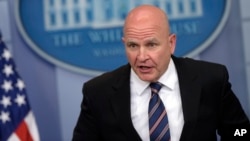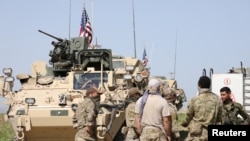U.S. National Security Adviser H.R. McMaster is due in Turkey this weekend, as a potential military confrontation looms between the two countries over Syria. The NATO allies disagree over Turkey’s military intervention in Syria against a Kurdish militia which is a key U.S. ally in the war against Islamic State.
Turkish Foreign Minister Mevlut Cavusoglu this week lambasted Washington, accusing it of making deals with Islamic State militants and claiming his government has lost confidence in its alliance with the U.S.
Such verbal assaults against Washington by Turkey’s political leadership are almost a daily occurrence. A recent poll found only three percent of Turks trust the United States.
Tensions have come to a head over Washington’s support of the YPG Syrian Kurdish militia in its war against Islamic State. That support has outraged Ankara, which accuses the militia of being linked to an ongoing Kurdish insurgency inside Turkey by the Kurdistan Workers Party (PKK).
Realpolitik
Political analyst Atilla Yesilada of Global Source Partners says when McMaster sits down for talks in Ankara, he will likely find little room to maneuver.
"Given the fact that there is this ironclad alliance between the PKK and the YPG, there is no way Turkey can allow a Syrian Kurdish state. Realpolitik is against that. Any Kurdish state will allow PKK activity, will provoke Turkish Kurds. I don't think the West understands that," Yesilada said.
Three weeks ago, in the face of repeated warnings by Washington, Turkish forces attacked the YPG Kurdish militia in the Syrian enclave of Afrin; but, diplomatic tensions could spill into a military confrontation between the NATO allies. Ankara is threatening to expand its operation to the Syrian town of Manbij, where U.S. forces are deployed with the YPG.
Political columnist Semih Idiz of the al-Monitor website says McMaster's visit suggests a confrontation can still be averted.
"It shows a reflexive desire on the part of Washington to maintain a dialogue with Turkey, despite all the vitriolic remarks coming out of Ankara. So the sides are going to try and see how they come around this problem that they have. On the other hand, the lines have been drawn so firmly, so there is a standoff there. It's a diplomatic one at the moment; whether it will turn into a military one or not, the coming days will have to show that. But the way things are in Syria, anything can happen," Idiz said.
Analysts suggest de-escalating bilateral tensions is complicated by mixed messages coming from Washington. Just days before McMaster’s visit, U.S. generals were quoted by international media reaffirming support for the YPG in Manbij and warning any attack would be aggressively opposed. Such comments further infuriated Ankara, which accuses Washington of reneging on promises made about the YPG.
Need for common ground
Sinan Ulgen, a visiting scholar at Carnegie Europe, says the priority for McMaster is bridging the current trust deficit.
“There is still time for Washington and Ankara to find common ground to eliminate the prospect of a direct conflict. And I would say primarily to try to find an actionable agenda that would start to recreate trust between the two parties. For instance, I suggest a dialogue on the humanitarian dimensions of this conflict [in Afrin], and primarily the U.S. and Turkey working together to establish a humanitarian corridor for the civilians who are caught by this conflict,” Ulgen said.
Analysts point out trust could be further enhanced if Washington took steps to address another Turkish concern, U.S.-based Turkish cleric Fethullah Gulen. Ankara blames Gulen for a 2016 coup attempt and is demanding, at a minimum, his house arrest pending an extradition request.
But columnist Idiz warns that Turkish President Recep Tayyip Erdogan's robust defense of the Syria military operation and his fiery declarations aimed at Washington, both popular among his constituents, means Erdogan may have already become trapped by his rhetoric.
"He is caught between a rock and hard place now. If he does go for a rupture, this is going to have very, very big ramifications, not just on the political, strategic dimensions, but also economic dimensions. But on the other hand, if he doesn’t, he appears weak in the eyes of his supporters," Idiz said.
Elections further hamper bilateral U.S.-Turkish diplomatic efforts, with growing rumors Erdogan may call an early presidential and general vote for later this year, seeking to exploit the current wave of nationalism and anti-Americanism. Analysts are already warning Turkish-U.S. relations are now facing their greatest test.






